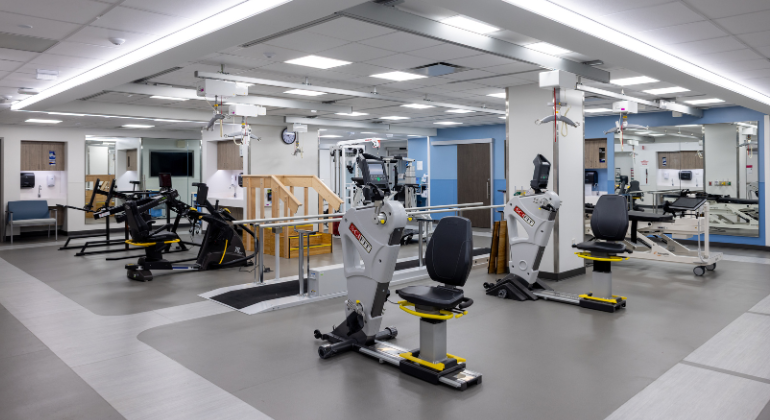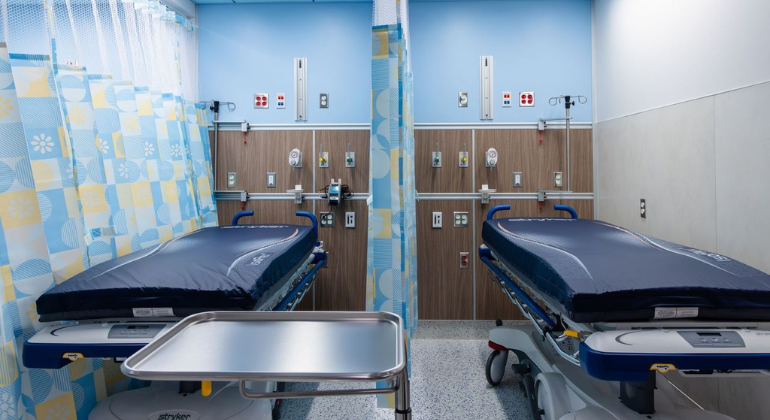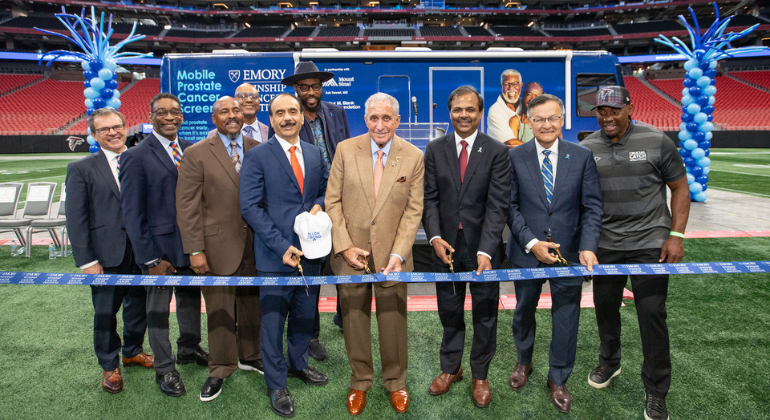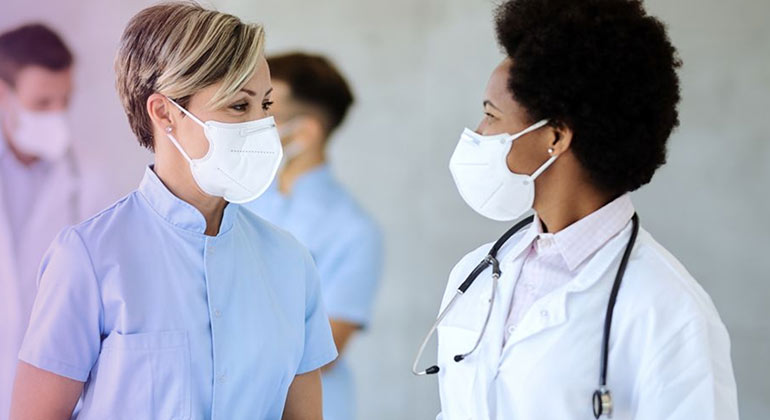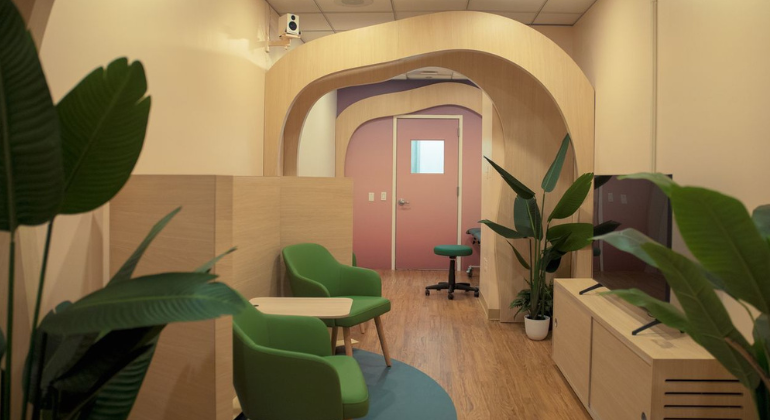Facts About Coordinated Care at Mount Sinai
Coordinated Care focuses not only on research, education and science, but on better patient-centered delivery systems and multi-disciplinary, team-based care.
Located between the affluent Upper East Side of Manhattan and East Harlem, Mount Sinai serves one of the most diverse patient populations in the world. As a major urban academic medical center with responsibility to treat the sickest and poorest patients, improving care coordination and delivery models is critical to maximize resources and improve outcomes.
Delivering New Models of Care
- Mount Sinai's new Medicare Shared Savings Program Accountable Care Organization (ACO). Mount Sinai Care, LLC, will provide approximately 26,000 Medicare beneficiaries with high quality care, while curbing growth in Medicare expenditures through greater integration and coordination across prevention, treatment and follow-up. Specially trained care coaches will work directly with patients to streamline and integrate their care across the clinical spectrum—from chronic disease management to specialty care and complex procedures.
- Mount Sinai's innovative post-acute care program, Preventable Admissions Care Team (PACT), targets patients at high-risk of readmission with personalized follow-up care, including assistance in making appointments and retrieving and understanding their medications. Transitional care workers, primary care providers and program volunteers also address psychosocial factors affecting the patient and family. From 2011 through 2012, the PACT program has resulted in a 58 percent reduction in emergency department visits, and a 45 percent reduction in hospital re-admissions, for a targeted group of high-risk patients.
- Mount Sinai has invested more than $120 million in electronic medical records and has been recognized by U.S. News and World Report as the “most connected” hospital in the New York City metropolitan area. The EPIC electronic medical record system, rolled out across inpatient and outpatient settings, is a critical component for improved communication among members of a patient's care team and between providers and patients, allowing drugs to be prescribed and health records to be exchanged electronically, and quality-related clinical data to be captured for analysis.
- Mount Sinai established the New York region's first geriatrics emergency department to meet the special needs of the New York region's growing aging population. More than 15,000 geriatric patients seek emergency care at Mount Sinai each year. Designed to reduce their susceptibility to falls, delirium, and other ailments, unique features include skid-proof floors, extra handrails and heating units, dimmable lighting, and noise-blocking curtains.
Providing a Team-Based Approach
- With six full floors of laboratory space and two floors of outpatient clinical space, the new state-of-the-art Leon and Norma Hess Center for Science and Medicine is designed to foster real-time collaboration between scientists and clinicians. Within the Hess Center, experts across disciplines work side-by-side to explore mechanisms and treatments in areas such as cancer, heart disease, brain and nervous system disorders, asthma, diabetes, and obesity.
- Mount Sinai's multi-disciplinary approach and ability to quickly translate research to clinical care mean improved outcomes that get patients back to work and everyday life within days, not weeks, and reduced health care costs for everyone. For example, Mount Sinai has the only head and neck program in the country designed to evaluate patients within seventy-two hours of referral and provide a comprehensive treatment plan at the conclusion of a patient's first visit—dramatically reducing the time between diagnosis and treatment.
- Mount Sinai's Diabetes and Cardiovascular Alliance, developed to combat the twin epidemics of obesity and diabetes in New York City, provides 1,200 patients with community-based care from endocrinologists, cardiologists, and certified diabetes educators, and has an 85% retention rate. Participants receive ongoing, personalized diabetes assessments between visits with physicians or other health care providers; one-on-one and group patient education; and a team of clinical experts who work directly at the point of care.
Increasing Access to High Quality Care
- The East Harlem Health Outreach Partnership provides free medical care to the community including preventive medical care and treatment, facilitated-benefits enrollment, mental health and psychosocial counseling, ophthalmology, family planning services and referrals to other agencies. Since 2004, the Partnership has provided $25 million in free medical care to uninsured East Harlem residents.
- Mount Sinai's new academic Department of Family Medicine and Community Health is designed to improve access to high-quality primary care in the Harlem community while conducting health services research, formulating national policy for primary care, and training the next generation of family physicians.
- The Mount Sinai Visiting Doctors Program – the largest academic house-call program in the nation – brings high-quality medical care to the homes of people with complex and serious illness. Its clinicians make more than 6,000 home visits annually to more than 1,000 patients. More than one-third of Visiting Doctor patients are from East Harlem.
About The Mount Sinai Medical Center
The Mount Sinai Medical Center encompasses both The Mount Sinai Hospital and Icahn School of Medicine at Mount Sinai. Established in 1968, the Icahn School of Medicine is one of the leading medical schools in the United States, and is noted for innovation in education, biomedical research, clinical care delivery, and local and global community service. It has more than 3,400 faculty in 32 departments and 14 research institutes, and ranks among the top 20 medical schools both in National Institutes of Health (NIH) funding and by U.S. News & World Report.
The Mount Sinai Hospital, founded in 1852, is a 1,171-bed tertiary- and quaternary-care teaching facility and one of the nation's oldest, largest and most-respected voluntary hospitals. In 2012, U.S. News & World Report ranked The Mount Sinai Hospital 14th on its elite Honor Roll of the nation's top hospitals based on reputation, safety, and other patient-care factors. Mount Sinai is one of 12 integrated academic medical centers whose medical school ranks among the top 20 in NIH funding and by U.S. News & World Report and whose hospital is on the U.S. News & World Report Honor Roll. Nearly 60,000 people were treated at Mount Sinai as inpatients last year, and approximately 560,000 outpatient visits took place.
For more information, visit http://www.mountsinai.org.
Find Mount Sinai on:
Facebook: http://www.facebook.com/mountsinainyc
Twitter @mountsinainyc @multiscalebio
YouTube: http://www.youtube.com/mountsinainy
About the Mount Sinai Health System
Mount Sinai Health System is one of the largest academic medical systems in the New York metro area, with 48,000 employees working across seven hospitals, more than 400 outpatient practices, more than 600 research and clinical labs, a school of nursing, and a leading school of medicine and graduate education. Mount Sinai advances health for all people, everywhere, by taking on the most complex health care challenges of our time—discovering and applying new scientific learning and knowledge; developing safer, more effective treatments; educating the next generation of medical leaders and innovators; and supporting local communities by delivering high-quality care to all who need it.
Through the integration of its hospitals, labs, and schools, Mount Sinai offers comprehensive health care solutions from birth through geriatrics, leveraging innovative approaches such as artificial intelligence and informatics while keeping patients’ medical and emotional needs at the center of all treatment. The Health System includes approximately 9,000 primary and specialty care physicians and 10 free-standing joint-venture centers throughout the five boroughs of New York City, Westchester, Long Island, and Florida. Hospitals within the System are consistently ranked by Newsweek’s® “The World’s Best Smart Hospitals, Best in State Hospitals, World Best Hospitals and Best Specialty Hospitals” and by U.S. News & World Report's® “Best Hospitals” and “Best Children’s Hospitals.” The Mount Sinai Hospital is on the U.S. News & World Report® “Best Hospitals” Honor Roll for 2025-2026.
For more information, visit https://www.mountsinai.org or find Mount Sinai on Facebook, Instagram, LinkedIn, X, and YouTube.
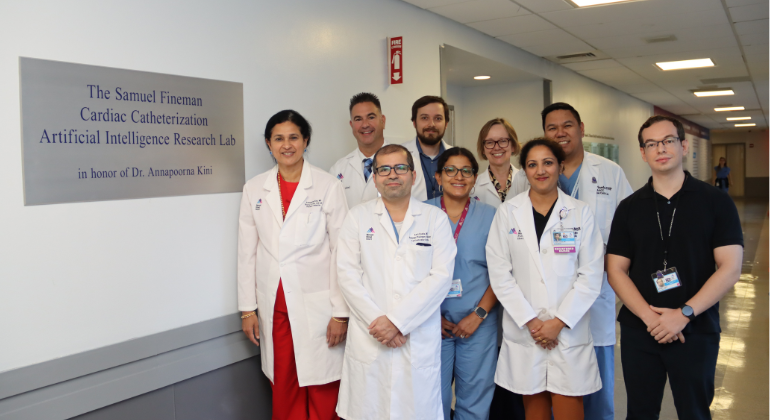
Mount Sinai Launches Cardiac Catheterization Artificial Intelligence Research Lab
Sep 15, 2025 View All Press Releases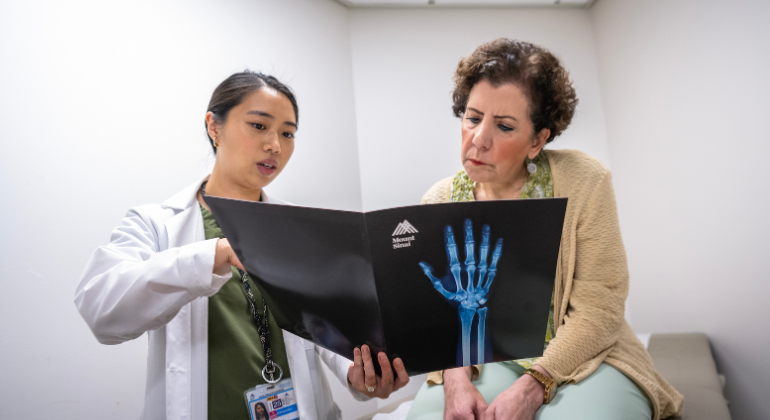
Mount Sinai Implements Own the Bone® Program for Fragility Fracture Patients
Jul 08, 2025 View All Press Releases
Mount Sinai Establishes Steven S. Elbaum Family Center for Caregiving
May 20, 2025 View All Press Releases
